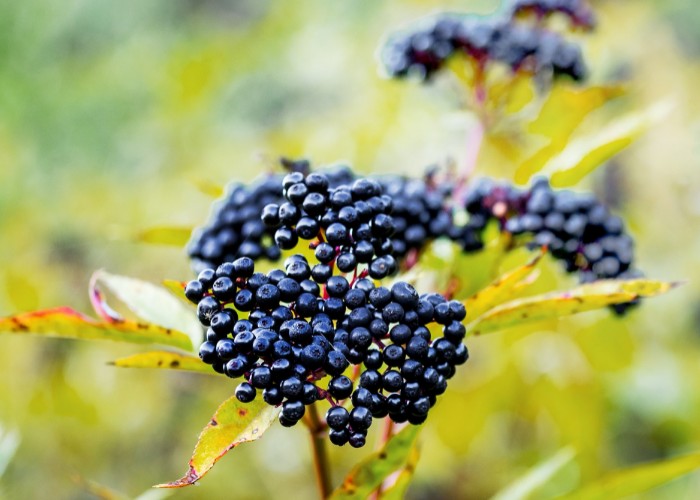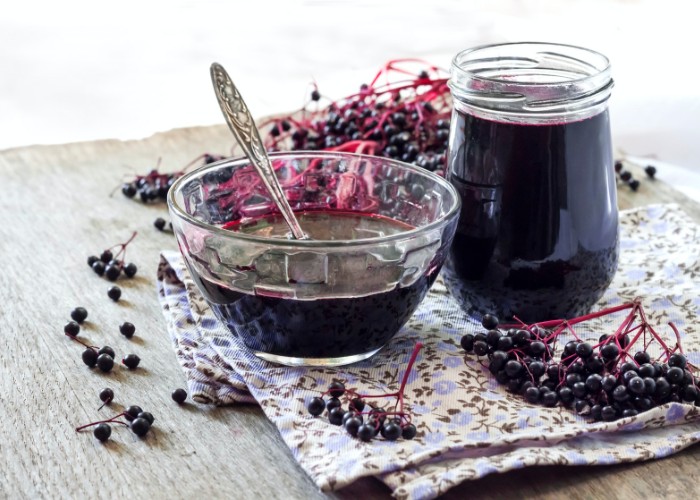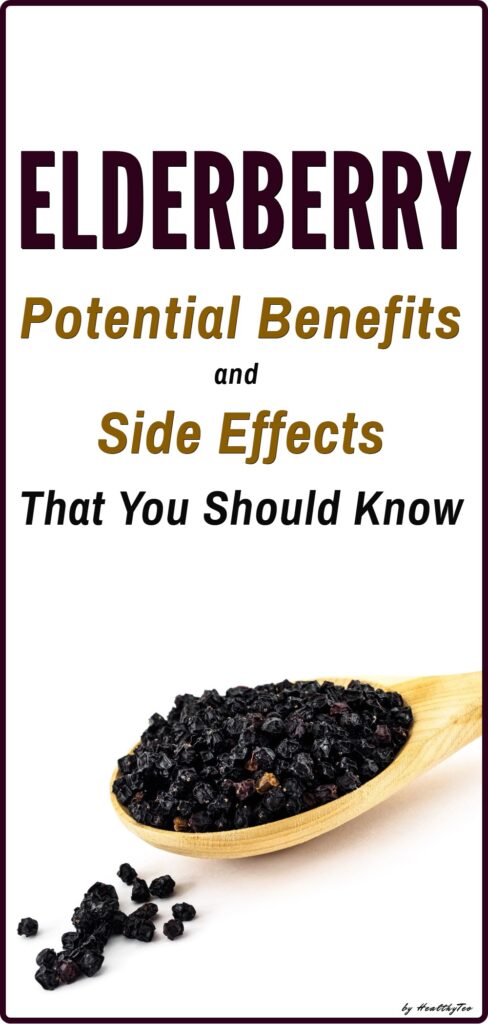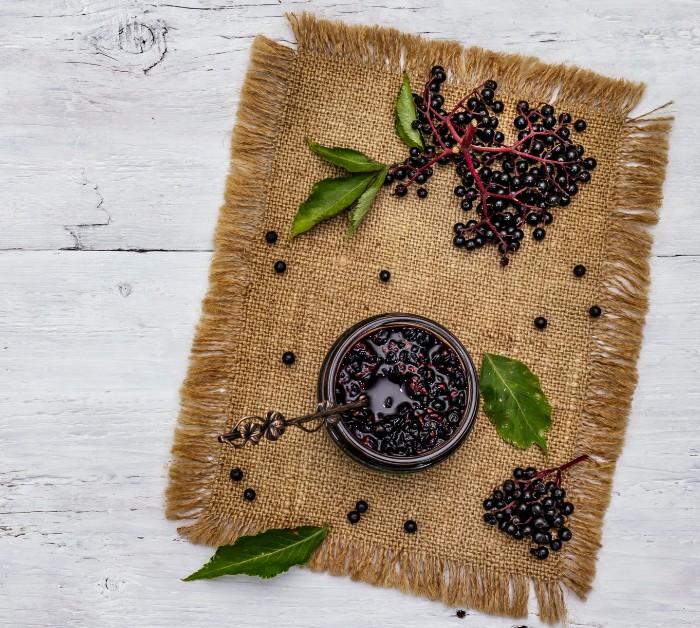Benefits and risks of elderberries
In this article, we will take a closer look at the benefits of elderberry, the risks and side effects of raw elderberry, and how to prepare elderberry syrup at home.
Before we start and see what are elderberries here are some interesting facts about this fruit:
- Elderberry is a perennial plant that can survive from 80 to 100 years in the wild.
- The fruit of elderberry is traditionally used in the manufacture of brandy, wine, and gin in certain European countries.
- Elderberry produces 12 to 15 pounds of berries per year.
- You should not consume raw berries or other parts of the plant since they contain cyanide-inducing chemicals. This compound is quickly destroyed when elderberries are cooked. Only eat cooked elderberries.
This post may contain affiliate links, which means we may receive a small commission, at no cost to you, if you make a purchase through a link. For more information, please see our disclosure.
What is elderberry?
Elderberry is the fruit of the flowering plant known as Sambucus. Elderberry refers to different varieties of Sambucus tree, the most common type is Sambucus nigra. It’s also known as the European elderberry or black elder.
The berries have a sharp, sweet flavor. You can not eat them raw but they are highly preferred for syrups, jams, desserts, spreads. They are black or very dark blue.

Elderberry nutrition facts
According to the USDA one cup ( 145g ) of raw elderberries contain:
- Calories: 106
- Carbs: 26.7 grams
- Protein: 0.957 grams
- Fat: 0.725 grams
Also, elderberries have many nutritional benefits. They are:
High in antioxidants
Elderberry contains the antioxidant flavonols quercetin, isorhamnetin, and kaempferol. The flowers contain up to 10 times more flavonols than the berries. Furthermore, elderberries are rich in anthocyanins. Compounds that give the fruit its dark black-purple color and are strong antioxidants with anti-inflammatory effects.
One of the anthocyanins found in the berries has 3.5 times the antioxidant power of vitamin E. Adding elderberry to the diet has only a small effect on antioxidant status. The processing of elderberries such as heating or juicing can reduce their antioxidant activity.
High in dietary fiber
Elderberries contain 10.2 grams of fiber per cup of fresh berries. This is about 36% of the daily value.
Vitamins and minerals
There are 52.2 milligrams of vitamin C in one cup of fruit. This is about 57% of the daily value. Elderberries provide beta carotene which converts to vitamin A in the body, meeting about 6% of your daily total. Also, this fruit supplies 6% of your daily dose of calcium.
The exact nutritional composition of elderberries depends on the variety of plant, environmental and climatic conditions, ripeness of the berries. Therefore servings can vary in their nutrition.
Potential benefits of elderberry
Elderberries have many health benefits. Here we take a look at the evidence behind some of the main reported benefits of elderberries. More research is needed on this topic. Many of the studies are conducted in lab settings and with a small number of participants.
May help fight colds and flu
Elderberry tea and syrup have always been used as a home remedy to treat the cold and flu. The elderberry syrup is believed to reduce the severity and duration of the infection if taken within 48 hours of the first symptoms. This claim is supported by some evidence.
A 2004 clinical trial of 60 people with influenza found that those who took 15 ml of elderberry syrup 4 times per day showed symptom improvement in 2-4 days, while the controlled group took 7-8 days to improve.
Further, a 2016 study from Australia reported that among 312 air-line travelers who took elderberry extract 10 days before traveling and 5 days after their flight, had 50% fewer sick days resulting from a cold than those who didn’t.
Researches also found that the elderberry extract in form of lozenges containing elderberry extract did not prevent the symptoms, but people who took elderberry had less severe symptoms that lasted for a shorter time.
Note that most research has only been performed on commercial products. There is little information about the efficiency of homemade remedies.
Elderberry may be good for heart health
One of the major benefits of elderberry is that is rich in bioactive flavonoids, which multiple studies have suggested help lower blood pressure and prevent the onset of progression of heart disease.
In a randomized controlled trial, adults 50 to 70 years old who were given a mixed berry beverage ( including elderberries ) daily for 4 weeks showed a significant decrease in cholesterol levels overall and LDL cholesterol compared to those given a placebo.
Furthermore, elderberries may reduce levels of uric acid in the blood. Elevated uric acid is linked to increased blood pressure and negative effects on heart health.
Even elderberry has some benefits for heart health, such as reducing cholesterol and uric acid. Further research is needed to demonstrate these positive effects.
Benefits of elderberry for skin
Elderberry’s antiseptic, anti-inflammatory and antiviral properties make it a great acne fighter. Like many of the fruits used in skincare, elderberries have high antioxidant content.
Especially flavonoids and anthocyanins (the compounds that give them their distinct dark color). According to some researchers, anthocyanins may improve skin structure and condition to enhance overall skin health.
These compounds deliver powerful protection from the damaging free radicals that are formed when we are exposed to environmental factors such as the sun and pollution.
Furthermore, elderberry is rich in vitamin A which helps fade age spots, as well as vitamins C and E both skincare powerhouses.
Risks and side effects
Despite the promising potential benefits of elderberry, there are several elderberry side effects associated with its consumption.
You should not consume raw berries or other parts of the plant. The bark, unripe berries, and seeds contain small amounts of substances called lectins (can cause stomach problems when consumed in excess, easy to get rid of through cooking).
In addition, you should not consume raw berries or other parts of the plant since they contain cyanogenic glycosides, which can cause cyanide poisoning.
Symptoms of eating uncooked berries, leaves, or bark of elderberries include nausea, diarrhea, and vomiting. The good news is that the small amounts of these toxic compounds in the berries can be removed by heat treatment or cooking of berries/juice.
However, the branches, bark, or leaves should not be used in cooking or juicing.
If you are collecting the berries or flowers by yourself be sure that you have correctly identified the plant as American or European elderberry. Other types of elderberry may be more toxic.
Also, be sure to remove any bark or leaves before using them.
Good to remember
Elderberries must be cooked before consumption. Eating raw berries may cause nausea, vomiting, diarrhea. Call your doctor if you experience any of these symptoms after consuming and elderberry extract or unripe fruit.
Generally, commercial preparations don’t cause adverse reactions when used at recommended dosages.
Elderberry is not recommended for:
- children
- pregnant women, or nursing mothers
- if you are on diabetic, diuretic, or laxative medications. Elderberries may interact with these medications aggravating their effect.
If you have any other ongoing health concerns talk with your doctor before taking elderberry.
How to eat elderberries
Today elderberry syrup, capsules, and lozenges are comercially available for treating flu and colds. Elderberry-based skin-care products are also available in many stores.
If you want to make elderberry syrup at home we will present you how to do it here, it is so easy. To make this syrup you can use dried elderberries, and fresh elderberries can use to make jams, pies, or beverages.
It is important to note that these foods may not have the concentration necessary to get the clinical effect of an extract or syrup.

To make homemade elderberry syrup you will need dried elderberries, water, ginger, cinnamon, and honey.
- Bring 3 cups water, 3/4 cup dried elderberries, 2 cinnamon sticks, and 1 piece of fresh ginger sliced to a boil in a small saucepan. Simmer uncovered 45-60 minutes until the mixture reduces to half.
- Remove from the heat and let it steep and cool slightly. Mash the elderberries with a potato masher to extract as much elderberry juice as possible.
- Strain the elderberry juice into a jar using a fine-mesh sieve. Discard the spent berries, cinnamon, and ginger.
- Whisk in 1/2 cup of honey until well combined. Your elderberry syrup is now done and you can store it in a sealed jar or bottle in a refrigerator. It will last for a week or longer, depending on the amount of honey you’ve added and how often you open the jar.
Always purchase elderberries from a reputable source, like grocery stores, health food stores, and reliable farmers’ markets. If you purchase elderberry as a supplement look for reputable vendors that offer third-party proof of potency, purity, and safety.

Final thoughts about the benefits of elderberries
Elderberries have been used for many years for their potential health benefits mostly to fight colds and the flu. While there are a few studies that support this claim, they have been conducted in a lab setting and on a small number of participants.
So, researchers need to investigate more before they are sure about the benefits of elderberries for all the consumers.
Elderberries are a flavorful addition to a healthy diet and a good source of vitamin C, antioxidants, and fiber.
You must remember one thing about elderberries: do not eat raw elderberries. They can cause nausea, vomiting, and diarrhea.




